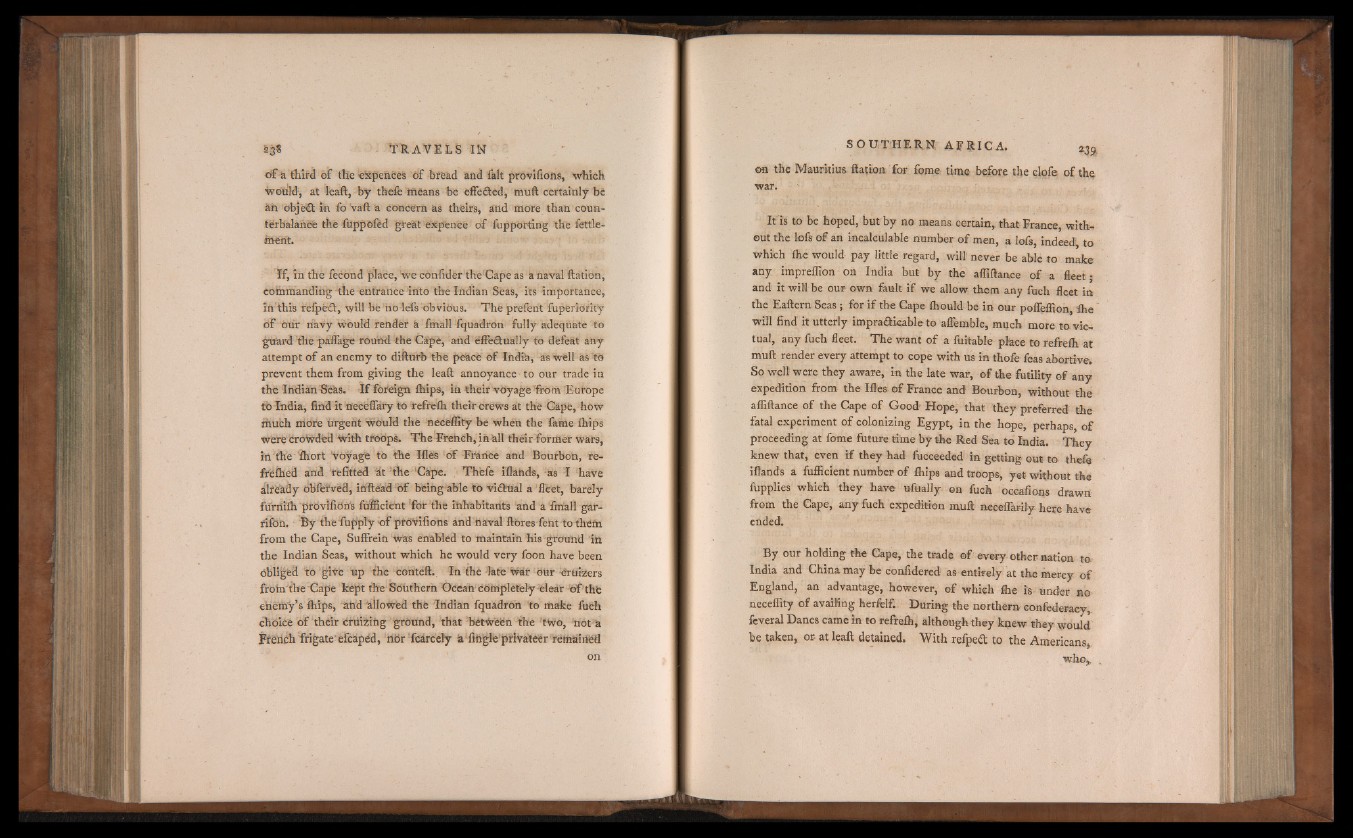
òf a third òf the ©Spences f>f bread and fait provifiofts, which
would, at leaft, by thefe means be effe&ed, muft certainly be
àn objèEt in fo va ft a concern as theirs, and more than counterbalance
thè ftippofèd great expence of fupporting the fettle-
iftent.
If, in the fecònd place, we cónlrder the'Cape as a naval ftation,
eofamanding the entrance into the Indian Seas, its importance,
in this iefpèét, will be no lefs òbvibus. Thè preferii fuperibrit'y
of our navy would render à finali fquadron fully adequate -to
guard the paflage round the Cape, and éfFeétually to defeat any
attempt o f an enemy to diftufb the peace of India, as well as to
prevent them from giving the leaft annoyance to our trade in
the Indian-Seks. If foreign ihips, in their -vOyage ffrom E-uiope
tb India, find it neceflary to refreih theirOrews at the Gape, how
thuch more urgent would thè neceflity be when the fame ihips
wèrè drotvdfed With troops. The Frehch, in-all their former wars,
in'the fhort voyage to the Ifles of France and Boufbon, re-
frefhed and tfefitted St the Cape. Thfefe i'flahds, -as I have
already obferved, ittftead of being-able to vidtual a fleet, barely
furnifh provifiOris fufficient ‘for the ihhabitarits and a fmàll gar-
rifon. By the fup’pty -of pfoVifions and naval fibres feht to théfh
from the Cape, Suffreiri was enabled to maintain his ground ’ih
the Indian Seas, without which he would very loon have been
bbli'gfed to give up the coritéft. In the lat-e War òrir drttfeers
frotn'the'Cape lcépt the Southern Ocean completely clear of ’the
enemy’s ihips, and allowed the Indian fquadron to make filch
choice of their ¿rtiiiiihg ground, that hétfvéén the -two, tibt-a
French frigate'efeapéd, nbr fcàrcely a-flhgle privateer remained
on
on the Mauritius ftation for fome time before the clofe of the
war.
It is to be hoped, but by no means certain, that France, with*,
out the lofs of an incalculable number of men, a lofs, indeed, to
which ihe would pay little regard, will never be able to malr-
any impreflion on India but by the afliftance of-a fleet;
and it will be our own fault if we allow them any fuch fleet in
the Eaftern Seas; for if the Cape fhould be in our pofleffion, ihe
will find it utterly impracticable to aifemble, much more to victual,
any fuch fleet. The want of a fuitable place to refreih at
muft render every attempt to cope with us in thole feas abortive.
So well were they aware, in the late war, of the futility of any
expedition from the Iftes of France and Bourbon, without the
afliftance of the Cape of Good- Hope, that they preferred the
fatal experiment of colonizing Egypt, in the hope, perhaps, of
proceeding at fome future time by the Red Sea to India. They
knew that, even if they had fticceeded in getting out to theie
iftands a fufficient number of Ihips and troops, yet without the
fupplies which they have ufually on fuch occafions drawn
from the Cape, any fuch expedition muft neceflarily here have
ended.
By our holding the Cape, the trade ©f ©very other nation to
India and China may be confidered as entirely at the mercy of
England, an advantage, however, of which flie is under no
neceflity of availing herfelf. During the northern confederacy,,
fcveral Danes came in to refreih, although they knew they would
be taken, or- at leaft detained. With refpeft to the Americans,
wh% .